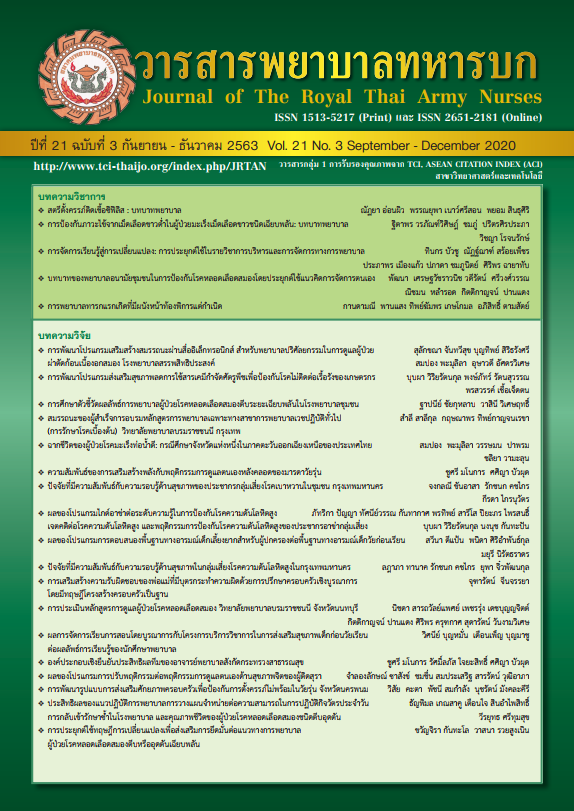Resilience in Older Adults at Wellness Center
Keywords:
resilience in older adults, healthy aging clinic, experienced life’s adversity, health perception, self- esteemAbstract
This survey research aims to study the Resilience Quotient of the 200 elderly people who came to receive services at the Healthy Aging Clinic, Chulalongkorn Memorial Hospital, The Thai Red Cross Society from January to August 2020.These volunteers replied 2 sets of questionnaires with 24 issues comprised of the general information and the elderly’s resilience then analyzed by descriptive statistics.
The results of the study were mainly female (85%), the early elderly of 60 – 69 year old (62%) marital status (49.0%), Buddhism (95.5%), mostly graduated Bachelor’s degree (52%). Most of the elderly perceived themselves healthy (53.0%). Most of them had underlying diseases (70.5%) and all had sufficient income to carry on their lives. Most of them experienced adversity (63.0%) which mainly due to the loss of their beloved ones (20%). Their total resilience is at the high level (57.5 %) followed by at the highest level (42.5 %). Their mental strength found at the highest score (51.0 %).
Recommendations reflect from the research results found that the early elderly perceive themselves healthy and have a high level of resilience, despite of having some of the underlying diseases as well as experienced life’s adversity. These findings could be used as an integrated approach to promote all well-being of the Thai elderly for their adjustment in any kind of changes: physically, mentally, socially, and economically.
Downloads
References
Intasit S, Julkiri S, editors. Plean Rai Klay Pen Dee: Resilience Quotients. 4th Bangkok: Beyond Publishing; 2019. (in Thai)
Parayat C, Kangchai W, Somanusorn S. Predicitve factors of resilience among elderly. Journal Of faculty of nursing Burapha University 2016; 24(2): 97-106. (in Thai)
Wongpanarak N, Chaleoykitti S. Depression: A significant mental health problem of elderly. Journal of The Royal Thai Army Nurses 2014; 15(3): 24-31. (in Thai)
Bureau of Mental Health Promotion and Development. A trainer’s handbook for organizing 5 dimensional happiness activities for elderly in community. Bangkok: National Office of Buddhism Press; 2017 (in Thai )
Fontes AP, Neri AL. Resilience in ageing: literature review. Cien Saude Colet 2015; 20(5): 1475-95.
McCombe G, Fogarty F, Swan D, Hannigan A, Fealy GM, Kyne L, et al. Identified mental disorders in older adults in primary care: A crosssectional database study. Eur J Gen Pract 2018; 24(1): 84-91.
Hengudomsub P. Resilience in later life. Thai Pharmaceutical and Health Science Journal 2007; 2(1): 115-23. (in Thai)
Phadungyam M, Duvall AC. Rehabilitation strategies for resilience quotient in the elderly. Journal of The Royal Thai Army Nurses 2018; 19(1): 66-73. (in Thai)
Maneerat S, Isaramalai S, Boonyasopun U. A conceptual structure of resilience among Thai elderly. International Journal of Behavioral Science 2011; 6(1): 24-40.
Toonsiri C, Hengudomsub P, Chaimongkol N, Photihung P. Factors Influencing Resilience among Community-Dwelling Older Adults with Chronic Illness: A Causal Model Testing. The Journal of Faculty of Nursing Burapha University 2019; 27(1): 78-88. (in Thai)
Koolnaphadol P, Haenjohn J. Education and development of resilience among elderly by integrating the participation process of the family and civil society networks. Health Systems Research Institute (HSRI) Burapha; 2015. (in Thai )
Wagnild GM, Young HM. Development and psychometric evaluation of the resilience scale. J Nurs Meas 1993: 1(2): 165-78.
Cossío-Torres P, Padrón-Salas A, Sathiyaseelan A, Soria-Orozco M, Nieto-Caraveo A. Psychosocial correlates of resilience among older adults in Mexico. Biomed Pharmacol J 2019; 12(2): 825-32.
Wagnild G. Resilience and successful aging. Comparison among low and high income older adults. J Gerontol Nurs 2003; 29(12): 42-9.
Chaosuansreecharoen KR. Chaosaunsreecharoen P. Khongsanit S. Predicting factors of resilience among the elderly residents of nursing home in Southern Thailand, Journal of Mental Health of Thailand 2019; 27(2): 65-79. (in Thai)
Rezaei M, Izadi-Avanji FS, Safa A, Fernanda Cal S. The Impact of Resilience on the Perception of Chronic Diseases From Older Adults’ Perspective. JCCNC 2018; 4(4): 231-39.
Pathike W. Wisitcharoen K. Community nurses’ roles to promote resilience in Thai older people. Journal of Health Science Boromara jonan i College of Nurs ing Sunprasitthiprasong 2019; 3(1): 1-12. (in Thai)
Musiksirijirakun T, Sawangsopakul B. Resilience, family relationships, social participation activities, life satisfaction of elderly, Tambon Bang Rak Phatthana, Amphoe Bang Bua Thong, Nonthaburi Province. Journal of Humanities and Social Sciences Mahasarakham 2016; 35: 75-86. (in Thai)
Linton AD, Lach HW. Matterson & McConnell’s gerontological nursing: Concept and practice. 3rd ed. St Louis: Saunders Elsevier; 2007.
Chunsorn N. Kangchai W. Rattanajarana S. Predictive factors of resilience among elderly with diabetes. Journal of Nursing and Health Sciences 2018; 12(2): 12-24. (in Thai)
Downloads
Published
How to Cite
Issue
Section
License
บทความหรือข้อคิดเห็นใดใดที่ปรากฏในวารสารพยาบาลทหารบกเป็นวรรณกรรมของผู้เขียน ซึ่งบรรณาธิการหรือสมาคมพยาบาลทหารบก ไม่จำเป็นต้องเห็นด้วย
บทความที่ได้รับการตีพิมพ์เป็นลิขสิทธิ์ของวารสารพยาบาลทหารบก
The ideas and opinions expressed in the Journal of The Royal Thai Army Nurses are those of the authors and not necessarily those
of the editor or Royal Thai Army Nurses Association.






